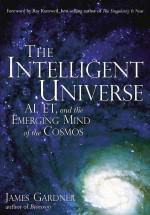
NEWS: Chatbots.org survey on 3000 US and UK consumers shows it is time for chatbot integration in customer service!read more..
The Intelligent Universe
AI, ET, and the Emerging Mind of the Cosmos

Editorial Reviews
From Publishers Weekly
Physicist and author Gardner expands on the themes of his 2003 title Biocosm, incorporating concepts of artificial intelligence, non-biological life and the possibility of extra-terrestrial intelligence. It is helpful, but not necessary, to have read Biocosm, as Gardner does provide a recap on his way to proposing that the universe itself is a form of life and that advanced artificial intelligence might be able to create more universes capable of developing more life. Gardner’s highly speculative propositions are presented in a passably written narrative, and he incorporates well-documented material from a wide range of past and contemporary thinkers, including Kurzweil, Bedau, Vinge, Penrose, Gould and Dawkins. Unfortunately, he makes the same mistake for which he criticizes others-assuming that because a given phenomena is not understood or observed at present, it never will be, thus justifying outrageous speculation or quasi-religious reasoning. In addition, Gardner ignores decades of research in chemosynthesis and abiogenesis, his understanding of evolutionary processes seems superficial and his knowledge of chemistry (including the chemical characteristics of elements) is clearly limited. As such, he mistakenly suggests, repeatedly, that well-understood processes are in fact scientific mysteries. For those interested in the cutting edge of contemporary physics (and its attending philosophy), Gardner’s book is helpful; nevertheless, a healthy skepticism is highly recommended.
Copyright © Reed Business Information, a division of Reed Elsevier Inc. All rights reserved.
New Comment
Only registered members are allowed to comment. or login
or login
